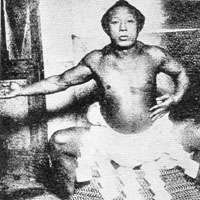Ōnishiki Daigorō
Ōnishiki Daigorō (Japanese: 大錦 大五郎, 1883 – May 18, 1943) was a Japanese professional sumo wrestler. He was the sport's 28th yokozuna.
| Ōnishiki Daigorō | |
|---|---|
| 大錦 大五郎 | |
 | |
| Personal information | |
| Born | Yamada Daigorō 1883 Aichi, Japan |
| Died | May 18, 1943 (aged 60) |
| Height | 1.76 m (5 ft 9 1⁄2 in) |
| Weight | 112 kg (247 lb) |
| Career | |
| Stable | Asahiyama |
| Record | 162-50-74 14draws-10holds (Makuuchi in Osaka) |
| Debut | November 1898 |
| Highest rank | Yokozuna (April 1918) |
| Retired | January 1922 |
| Championships | 6 (Osaka Makuuchi, unofficial) |
| * Up to date as of October 2007. | |
Career
He was born Yamada Daigorō (山田 大五郎) in Ama District, Aichi Prefecture, in what is now Yatomi City. There are several conflicting sources as to his specific birth date in 1883, and he later changed his surname to Torii (鳥井)
He started sumo in Kyoto in 1898, later moving to Osaka. He entered the top makuuchi division in February 1906. He was promoted to ōzeki in June 1910. In April 1918 he became the 28th yokozuna (the third in Osaka sumo). The reason for his promotion to yokozuna was cited as being because of his great dignity.[1] He fought in eight tournaments as yokozuna, retiring after the January 1922 basho.
After retirement he ran a tea house in Osaka.
Some of his memorabilia is on display in a museum in Yatomi City.
Osaka sumo top division record
- Osaka sumo existed independently for many years before merging with Tokyo sumo in 1926. 1–2 tournaments were held yearly, though the actual time they were held was often erratic.
| First | Second | |||||
|---|---|---|---|---|---|---|
| 1906 | East Maegashira #8 5–2–1 1d 1h |
East Maegashira #5 4–1–5 |
||||
| 1907 | West Maegashira #1 5–2–1 2h |
West Komusubi 6–3–1 |
||||
| 1908 | West Sekiwake 6–3–1 |
West Sekiwake 8–1–1 |
||||
| 1909 | West Sekiwake 5–3–2 |
West Sekiwake 7–1–2 |
||||
| 1910 | West Sekiwake 3–2–3 1d 1h |
West Ōzeki 5–3–1 1d |
||||
| 1911 | West Ōzeki 2–3–4 1d |
West Ōzeki 8–1–1 Unofficial |
||||
| 1912 | West Ōzeki 7–1–1 1d |
Not held | ||||
| 1913 | West Ōzeki 7–2–1 |
West Ōzeki 7–2–1 Unofficial |
||||
| 1914 | West Ōzeki 6–1–3 |
West Ōzeki 8–0–1 1d Unofficial |
||||
| 1915 | East Ōzeki 6–2–2 |
East Ōzeki 8–0–2 Unofficial |
||||
| 1916 | East Ōzeki 5–2–2 1h |
Not held | ||||
| 1917 | East Ōzeki 8–0 2h Unofficial |
East Ōzeki 7–1 1d 1h |
||||
| 1918 | West Ōzeki 8–1 1h Unofficial |
East Yokozuna 2–4–3 1d |
||||
| 1919 | West Yokozuna 1–1–8 |
West Yokozuna 6–2 2d |
||||
| 1920 | West Yokozuna 1–1–8 |
East Yokozuna 4–3 2d 1h |
||||
| 1921 | Sat out | East Yokozuna 4–0–5 1d |
||||
| 1922 | West Yokozuna 3–2–4 1d |
Retired – |
||||
| Record given as win-loss-absent Top Division Champion Top Division Runner-up Retired Lower Divisions Key:d=Draw(s) (引分); h=Hold(s) (預り) | ||||||
*Championships for the best record in a tournament were not recognized or awarded in Osaka sumo before its merger with Tokyo sumo, and the unofficial championships above are historically conferred. For more information, see yūshō.
References
- Atsuo Tsubota. 横綱伝 26代~31代 (in Japanese). Retrieved 2008-05-26.
- 横綱力士幕内星取表 (in Japanese).
See also
- Glossary of sumo terms
- List of past sumo wrestlers
- List of sumo tournament top division champions
- List of yokozuna
| Preceded by Tochigiyama Moriya |
28th Yokozuna 1918–1922 |
Succeeded by Miyagiyama Fukumatsu | ||
| Yokozuna is not a successive rank, and more than one wrestler can hold the title at once | ||||